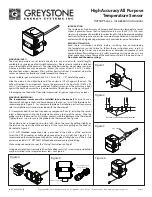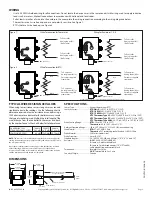
Page 2
WIRING
•
Use 18-24 AWG shielded wiring for all connections. Do not locate the device wires in the same conduit with wiring used to supply inductive
loads such as motors. Make all connections in accordance with national and local codes.
•
Pull at least six inches of wire into the enclosure, then complete the wiring connection according to the wiring diagrams below.
•
Thermistors are a 2 wire hook up and are not polarity sensitive. See Figure 7.
•
RTD’s that are 3 wire hook up, see Figure 8.
SPECIFICATIONS
:
Sensor Type:
..........................................
Various thermistors or RTD
Sensor Accuracy: .................................
RTD Class A:
±0.15°C (±0.27°F) @ 0°C (32°F)
RTD 1/3 DIN:
±0.1°C (±0.18°F) @ 0°C (32°F)
RTD 1/10 DIN:
±0.03°C (±0.054°F) @ 0°C (32°F)
NTC Thermistor Type 39:
±0.05°C (±0.09°F), 0 to 70°C (32 to 158°F)
NTC Thermistor Type 55:
±0.03°C (±0.054°F), 0 to 70°C (32 to 158°F)
NTC Thermistor Type 40/46:
±0.1°C (±0.18°F), 0 to 70°C (32 to 158°F)
Probe Sensing Range: ......................
RTD:
-20 to 100°C (-4 to 212°F)
Thermistors:
-40 to 100°C (-40 to 212°F)
Ambient Operating Range: ............-40 to 50°C (-40 to 122°F), 5 to 95 %RH non-condensing
Wire Material: ........................................
RTD:
FT-4, 22 AWG, 3 Wire
Thermistor:
PVC insulated, parallel bonded, 22 AWG, 2 Wire
Probe Material: .....................................304 Series stainless steel
Probe Diameter:...................................6 mm (0.236")
Standard lengths: ................................50, 100, 150, 200, 300, and 450 mm (2", 4", 6", 8", 12", and 18")
Enclosure: ................................................
A:
ABS, UL94-V0, IP65 (NEMA 4X)
C:
Same as A, with terminal block
E:
Same as C, with thread adapter (1/2" NPT to M16),
cable gland fitting, and terminal block
Termination: ..........................................
A:
pigtail, 2 or 3 wire
C & E:
Terminal block, 2 or 3 wire
Country of Origin: ...............................Canada
PRINTED IN C
ANAD
A
TYPICAL WIRE RESISTANCE VALUES
When using low resistance sensors, long wire runs can add
significant error to the readings. Use the following chart to
determine errors due to wire resistance or consider using a
1000 ohm sensor or a transmitter for better accuracy. Locate
the type of wire being used. Multiply the total length of the
wire (distance from the controller to the sensor and back)
by the number found in the chart below for total resistance.
Figure 7 2 Wire Termination for Thermistor
Figure 8 3 Wire Termination for RTD
To Controller
Analog Input (AI)
(No Polarity)
To Controller
Analog Input (AI)
(No Polarity)
To Controller
Analog Input (AI) or
Customer supplied
transmitter
To Controller
Analog Input (AI) or
Customer supplied
transmitter
Green
Black
Red
EMT Connector
EMT Connector
Wiring for Enclosures C & E
GAUGE WIRE TYPE 18 AWG 22 AWG 24 AWG
STRANDED (OHMS/FOOT) 5.85 mΩ 14.75 mΩ 23.29 mΩ
SOLID (OHMS/FOOT) 6.4 mΩ 15.85 mΩ 25.72 mΩ
To Controller
Analog Input (AI)
(No Polarity)
To Controller
Analog Input (AI)
(No Polarity)
To Controller
Analog Input (AI) or
Customer supplied
transmitter
To Controller
Analog Input (AI) or
Customer supplied
transmitter
Green
Red
Black
DIMENSIONS
EMT Connector
EMT Connector
82.5 mm
3.25"
69.8 mm
2.75"
Various Probe Lengths
See Specifications
6 mm
0.236"
76.2 mm
3.00"
0.5" NPT
Foam Gasket
304 Series S/S Probe
*For illustrative purposes only, terminal block mounted on inside of cover
*
*
52 mm
2.05"
NOTE:
The sensor accuracies listed in the specifications section apply to the
sensing element only prior to product assembly and may not be reflected in
the complete assembly.
Due to the measurement uncertainty, it is possible, that the true resistance
value of the single delivered sensor at 0°C can be out of the defined
tolerance class. Profiling each assembly to take into consideration lead wire
and the attachment method should be completed.
IN-GE-HATSAPXXX-02
Copyright © Greystone Energy Systems, Inc. All Rights Reserved Phone: +1 506 853 3057 Web: www.greystoneenergy.com




















